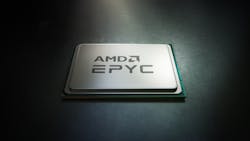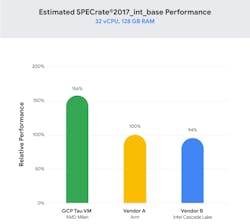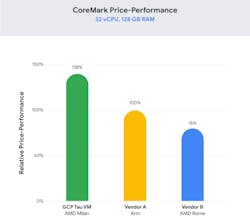Google Rolls Out New Cloud Services Using AMD's Server CPUs
Google rolled out a new class of cloud services based on AMD's latest EPYC server chips, giving AMD a major design win as it works to weaken Intel’s stronghold in the market for data center processors.
The technology giant introduced its new family of "Tau" virtual machines (VMs) targeted at customers running resource-heavy, large-scale workloads in the data center. The company said the VMs extend Google Compute Engine's VM product offerings and are based on AMD's new third-generation EPYC CPUs, previously code-named Milan. That gives the VMs a performance uplift of around 50% while reducing costs compared to VMs powered by Intel and Arm CPUs from rival cloud service vendors.
Google and other cloud industry giants, such as Amazon Web Services (AWS) and Microsoft, purchase vast quantities of server chips largely from Intel to upgrade the colossal data centers that they operate. They use the chips in servers as well as storage and networking hardware that they rent out to millions of customers around the world as pay-as-you-go services or "instances."
Google rolled out cloud services based on AMD's first-generation EPYC CPUs for the first time in 2017, and last year it said that it would leverage AMD's EPYCs for a secure "confidential computing" instance.
AMD Chief Executive Lisa Su said in a statement the EPYC processors at the heart of the Tau public cloud service will give Google's customers “powerful new options to run their most demanding scale-out workloads.” Google said that the instances are ideal for heavy-duty workloads in the data center, including microservices that run inside software containers as well as audio and video transcoding.
AMD introduced its latest line of EPYC CPUs back in March. AMD upgraded the underlying "Zen 3" microarchitecture at the heart of the 7-nanometer server CPU while it also enlarged the L3 cache, giving it a generational leap of 19% in instructions per clock cycle over its previous generation, based on "Zen 2." AMD's "Milan" chips integrate up to 64 CPU cores per die and up to 128 PCIe Gen 4 ports.
Urs Holzle, who serves as senior vice president of cloud infrastructure at Google, and June Yang, VP and GM of compute at Google Cloud, said that T2D, the first instance in its new family of VMs, runs on AMD's "Milan" CPUs and “leapfrogs the VMs for scale-out server workloads of any leading public cloud provider available today both in terms of its performance and workload total cost of ownership (TCO)."
Google said instances running on AMD EPYCs will have 56% more overall performance and a 42% hike in performance-per-dollar compared to general-purpose VMs from two unnamed major cloud vendors. These instances include one based on Arm CPUs and another tapping Intel’s second-generation Xeon Scalable “Cascade Lake” CPUs, which are a full generation behind its latest “Ice Lake” server chips.
Google, which is No.3 in the cloud market behind Amazon and Microsoft, said the instances support 38% more performance per dollar than rival Arm-based instances running the CoreMark benchmark.
Google declined to identify the leading cloud service providers it tested against the T2D instance. But Amazon has been developing its Arm-based Graviton CPUs for years, which it uses in a wide range of services for general-purpose computing workloads. The company said its Graviton-backed services are available at a much lower cost than existing offerings powered by Intel's Xeon Scalable CPUs.
One of the other key advantages of AMD's EPYCs is their compatibility with x86-based server chips. That means customers will not have to waste resources on porting applications from Intel Xeons to run on AMD EPYCs, which they would have to do to take advantage of services based on Amazon's Graviton or other Arm-based CPUs. Oracle has also rolled out cloud services that run on Ampere Computing's Altra server chips, which contain up to 80 cores, plus a suite of development tools.
“At Google Cloud, our customers’ compute needs are evolving,” added Thomas Kurian, CEO of Google Cloud, in a statement. “Our work with key strategic partners like AMD has allowed us to broaden our offerings and deliver customers the best price-performance for compute-heavy, business-critical applications." Google said the T2D instance will become available in the third quarter of 2021.
AMD has been stealing market share from Intel, which has long been the dominant player in the data center area. Intel has been grappling with delays in its manufacturing operations, which have caused its flagship server processors to lag AMD's rival offerings. Intel, which commands 90% of the market share, is striking back against AMD's "Milan" with its "Ice Lake" server chips introduced in April.
The Santa Clara, California-based company said that all the top cloud vendors would support its new lineup of Xeon Scalable CPUs. But it is unclear when Google plans to make such services available.
About the Author
James Morra
Senior Editor
James Morra is the senior editor for Electronic Design, covering the semiconductor industry and new technology trends, with a focus on power electronics and power management. He also reports on the business behind electrical engineering, including the electronics supply chain. He joined Electronic Design in 2015 and is based in Chicago, Illinois.



